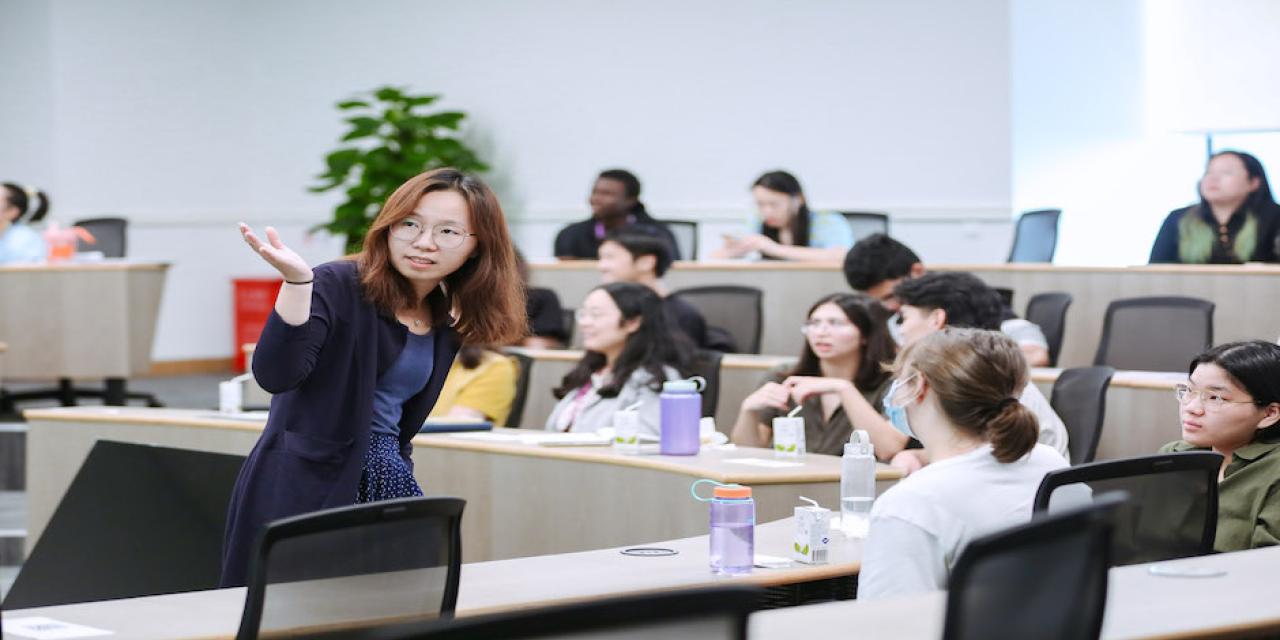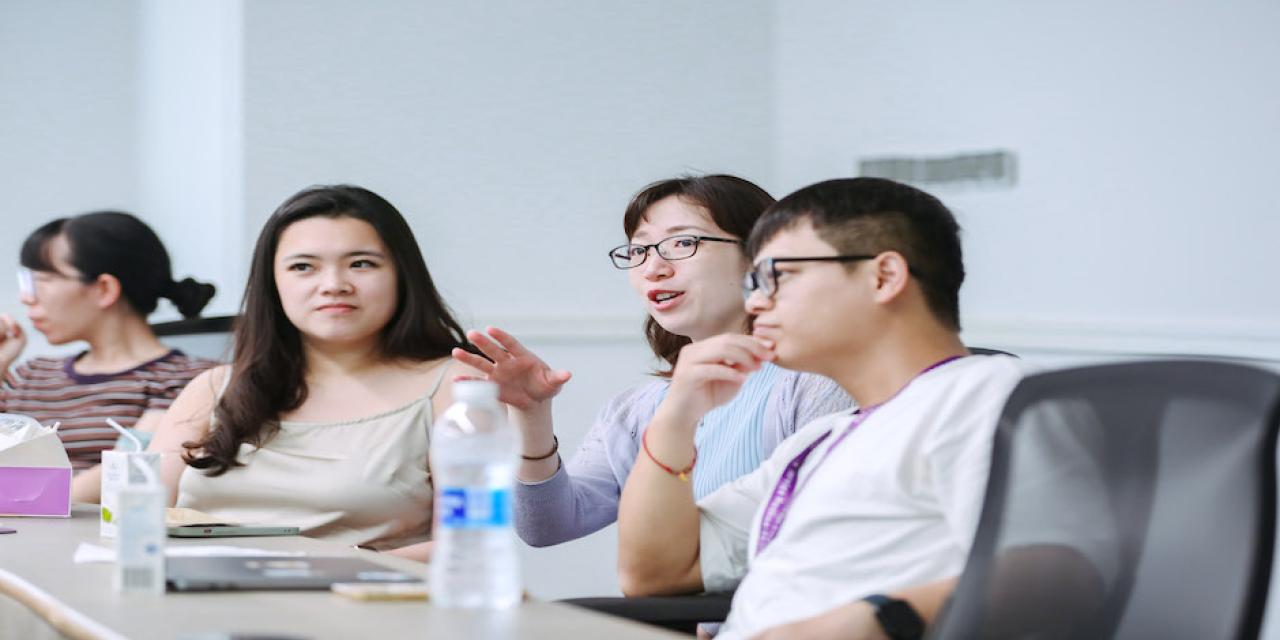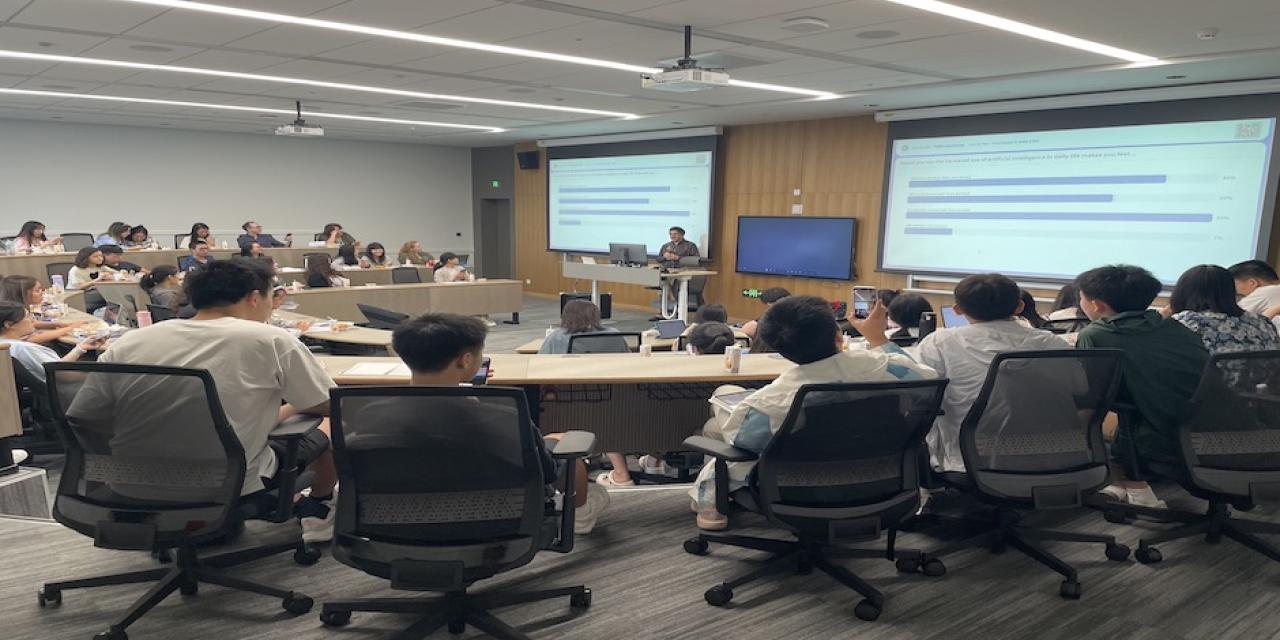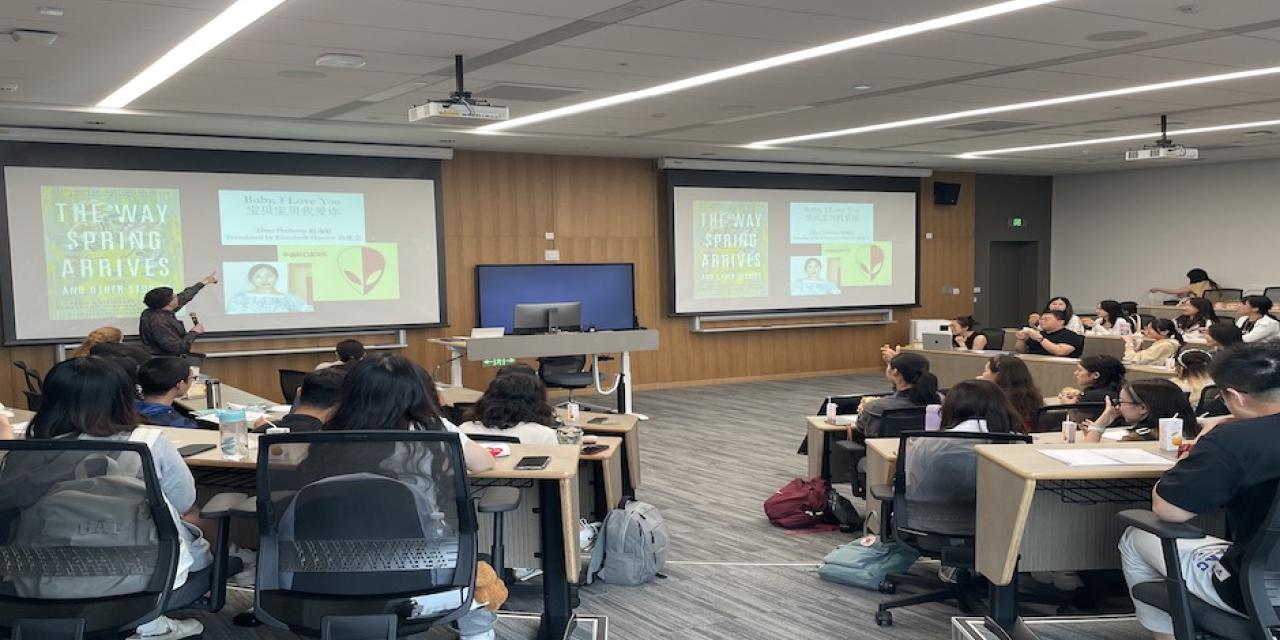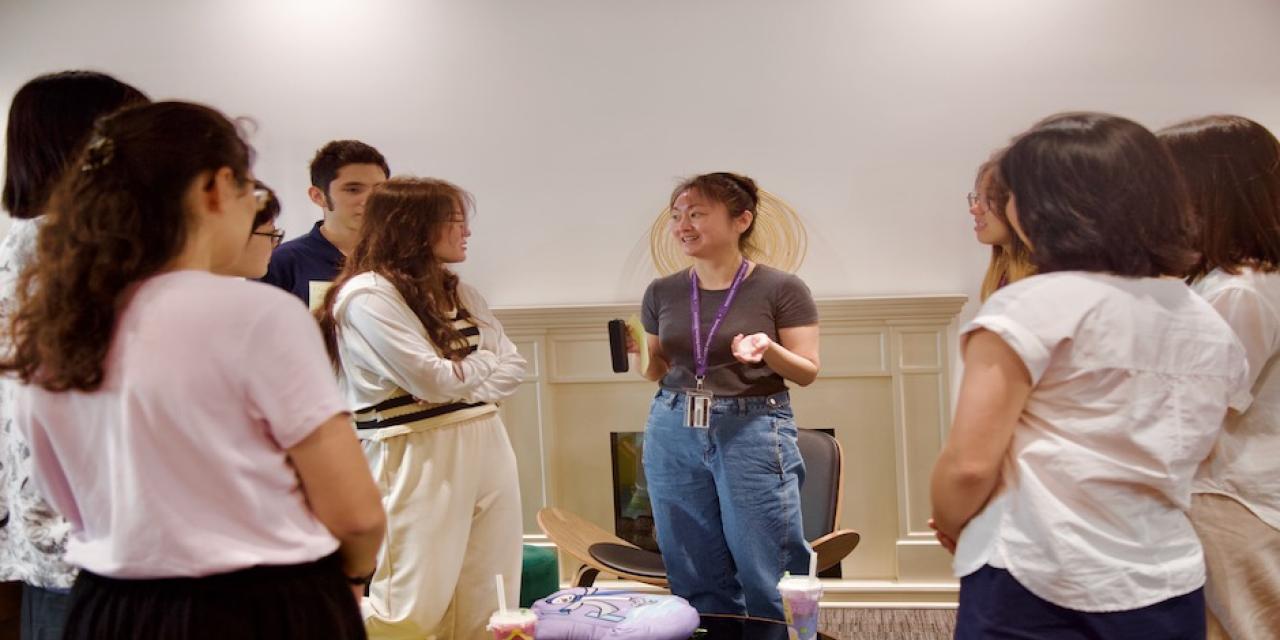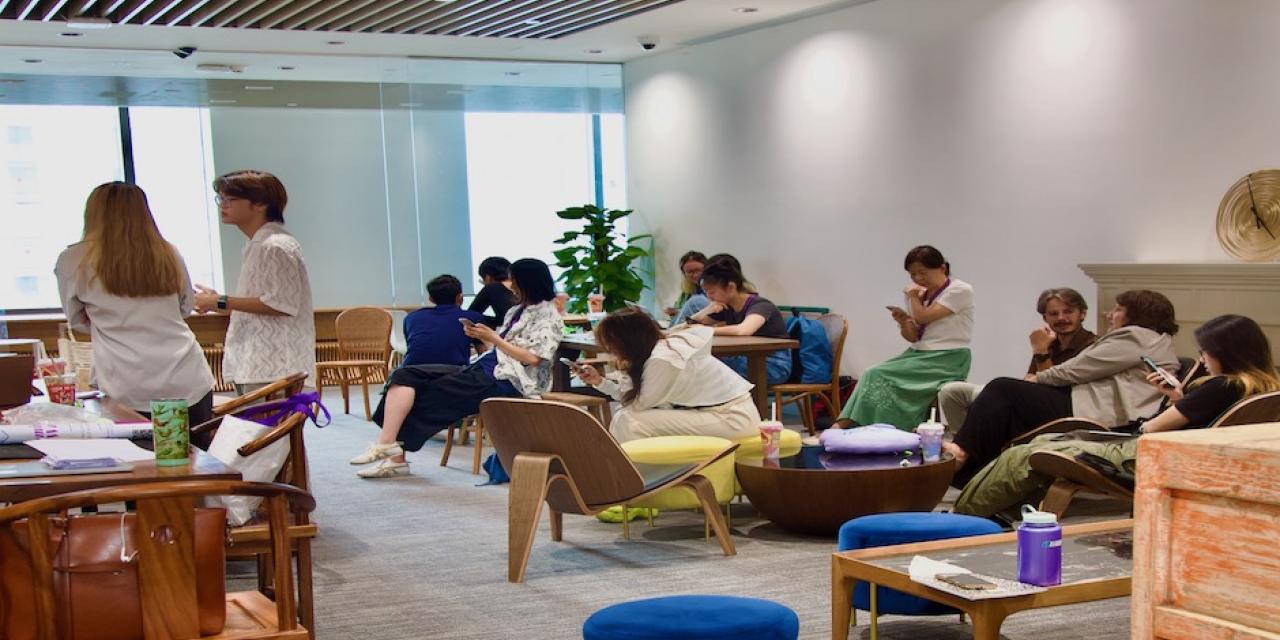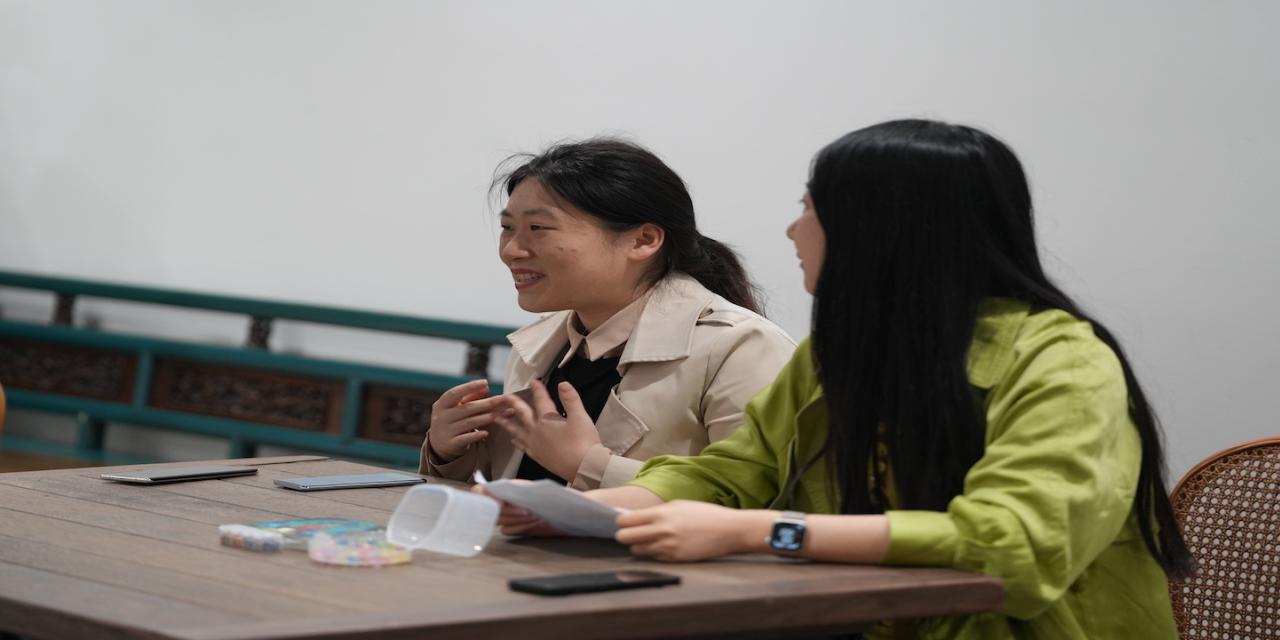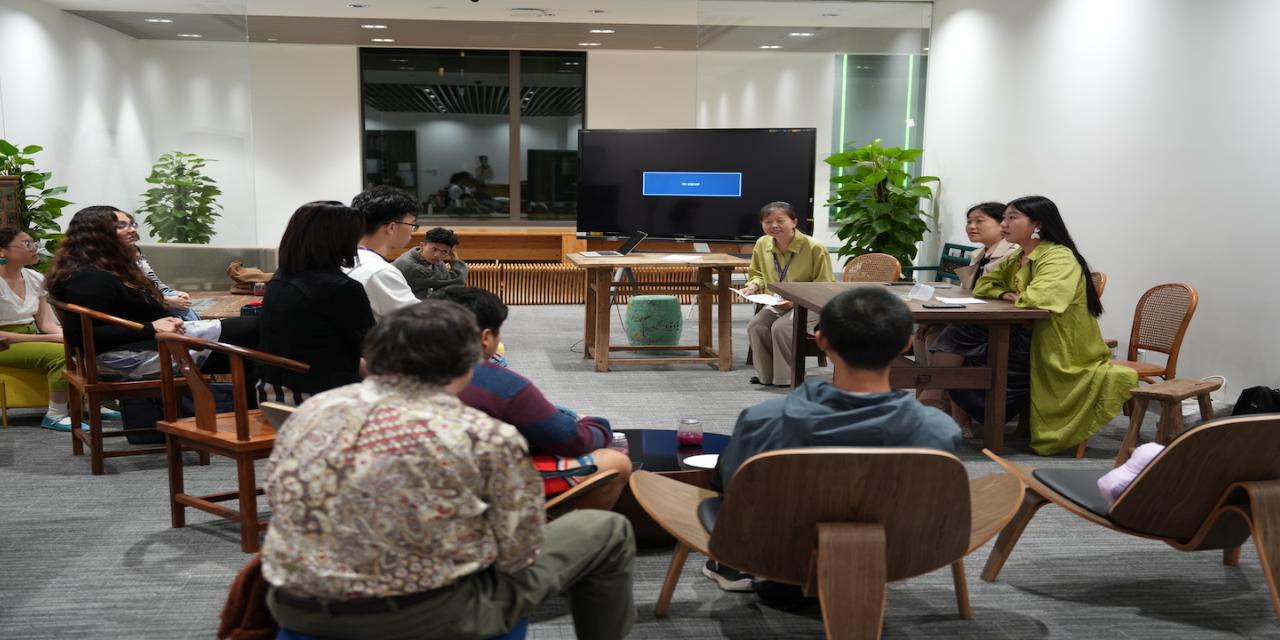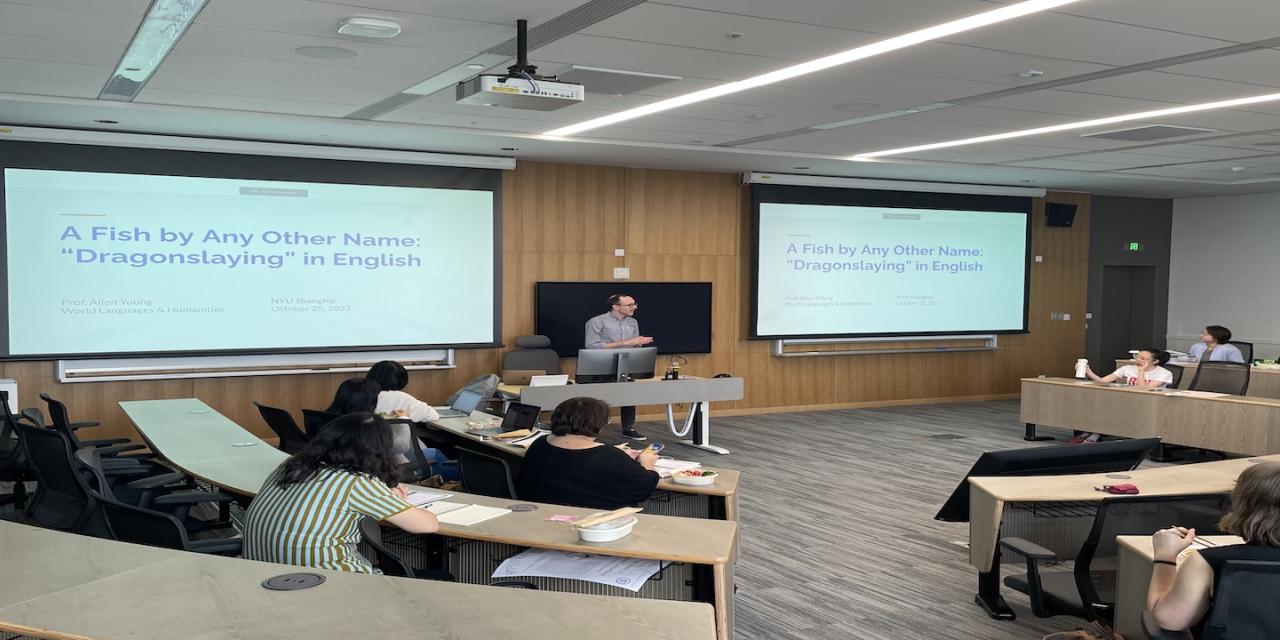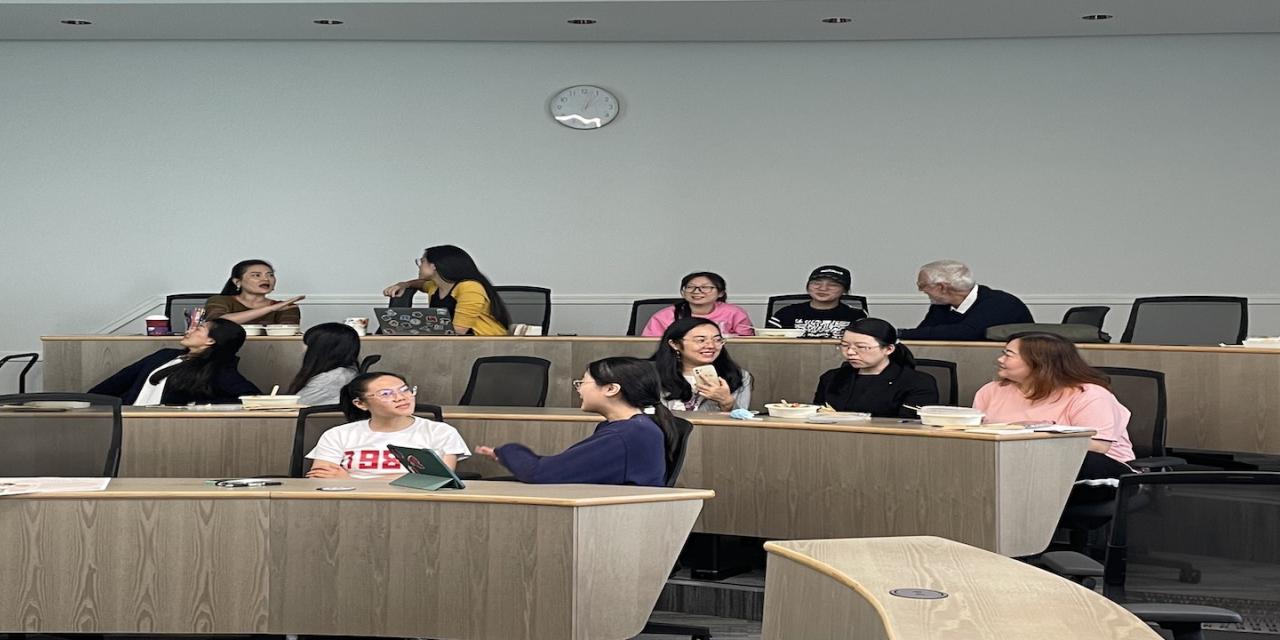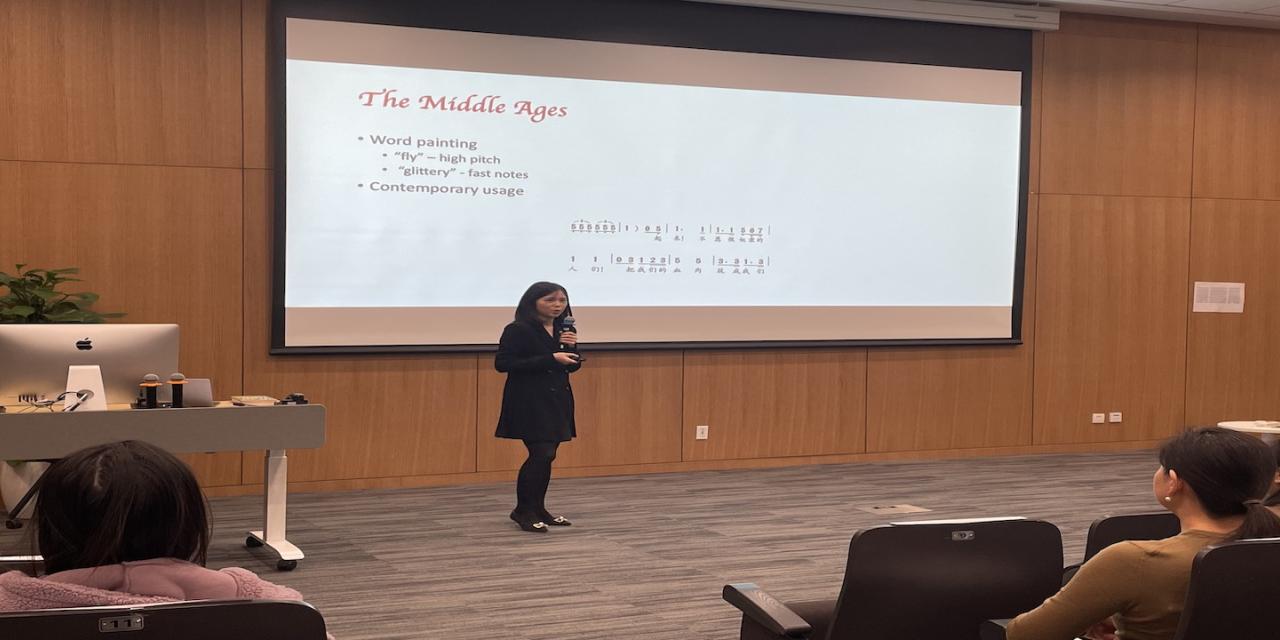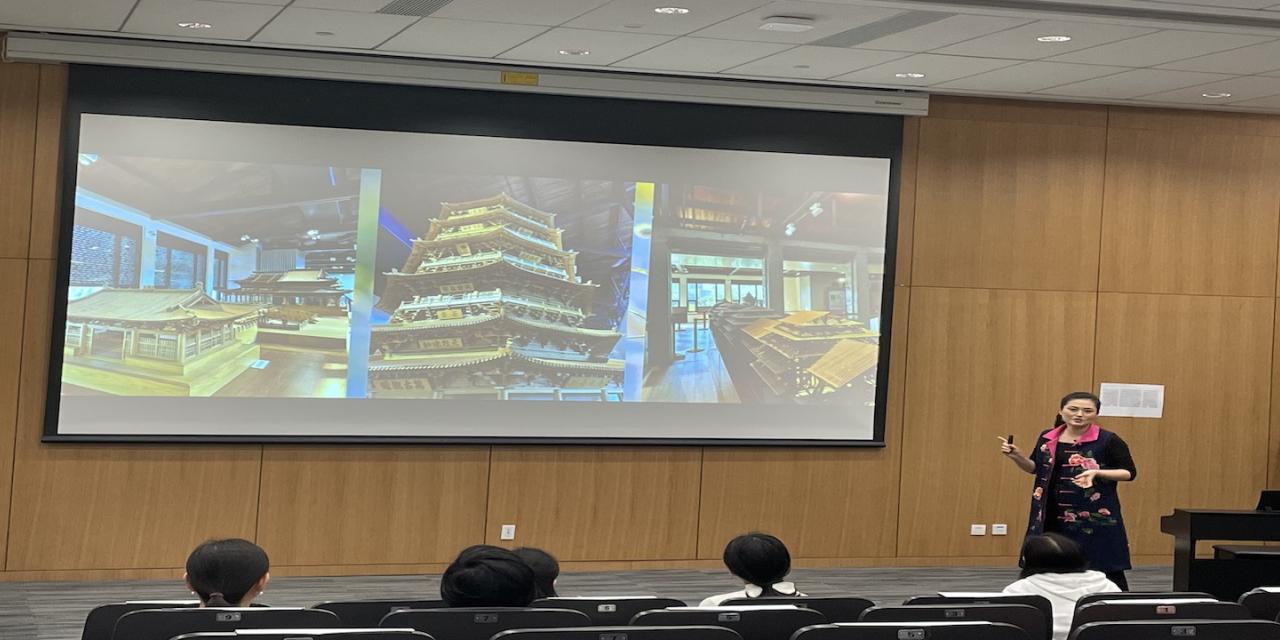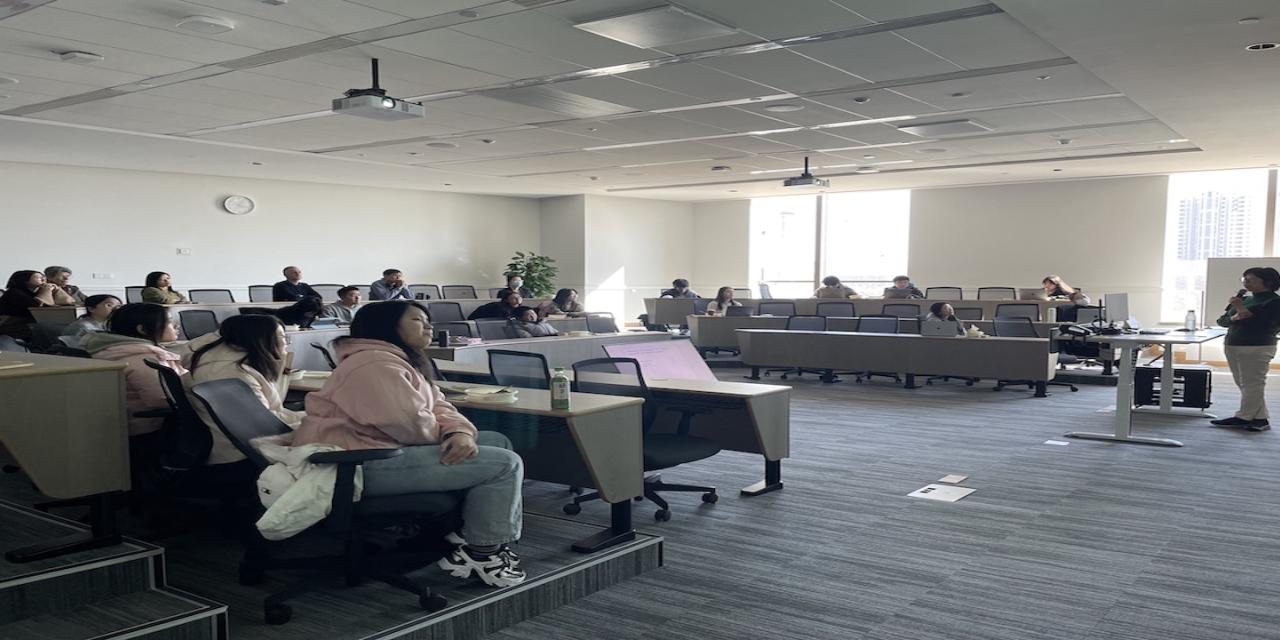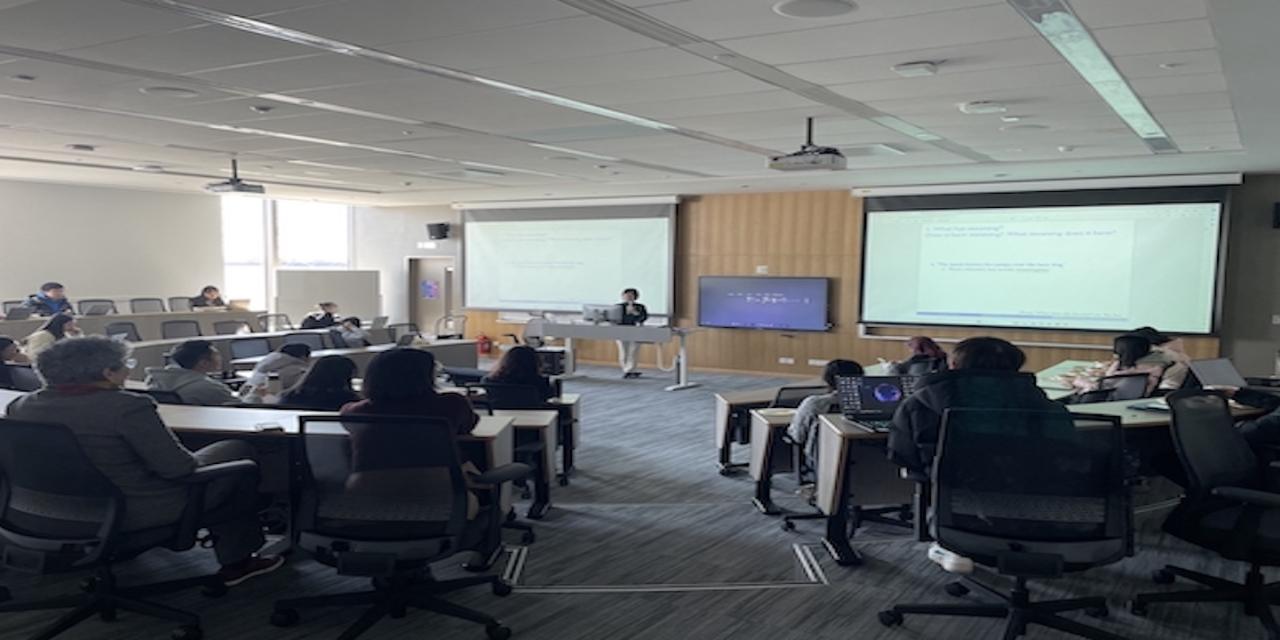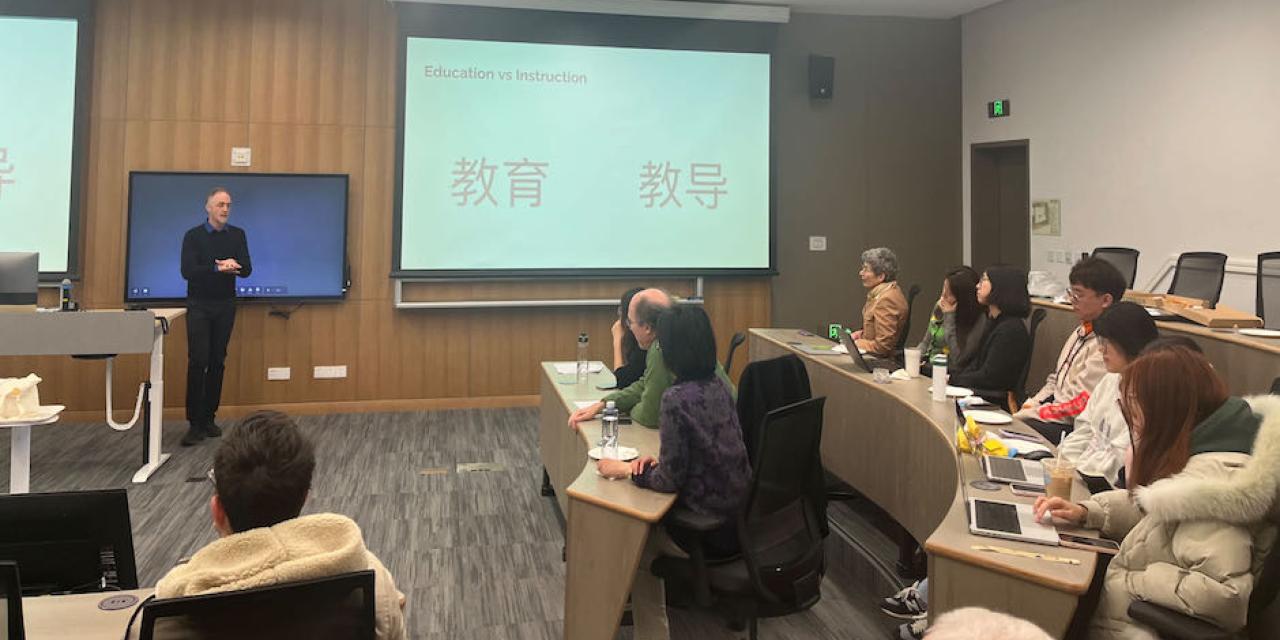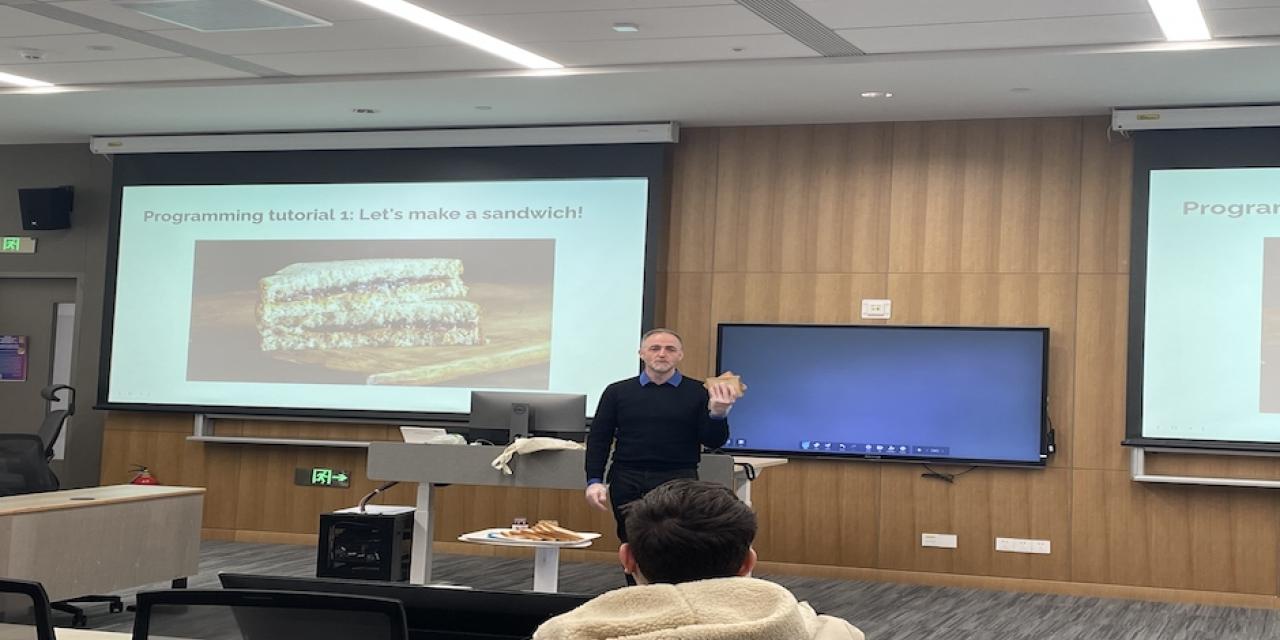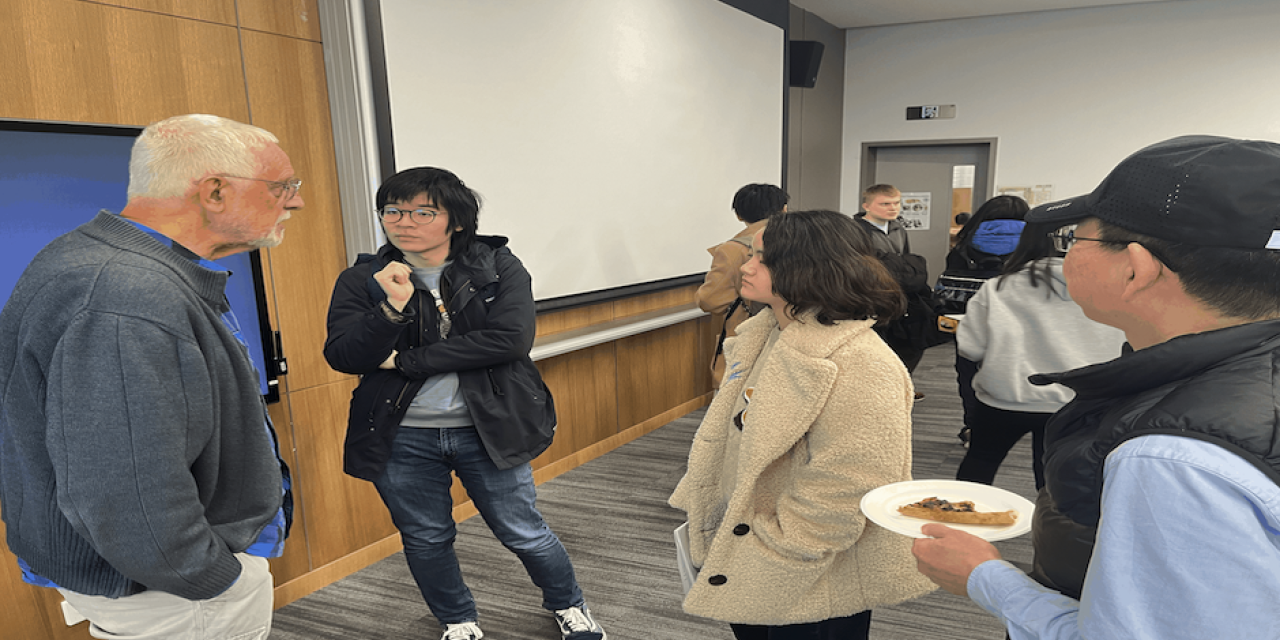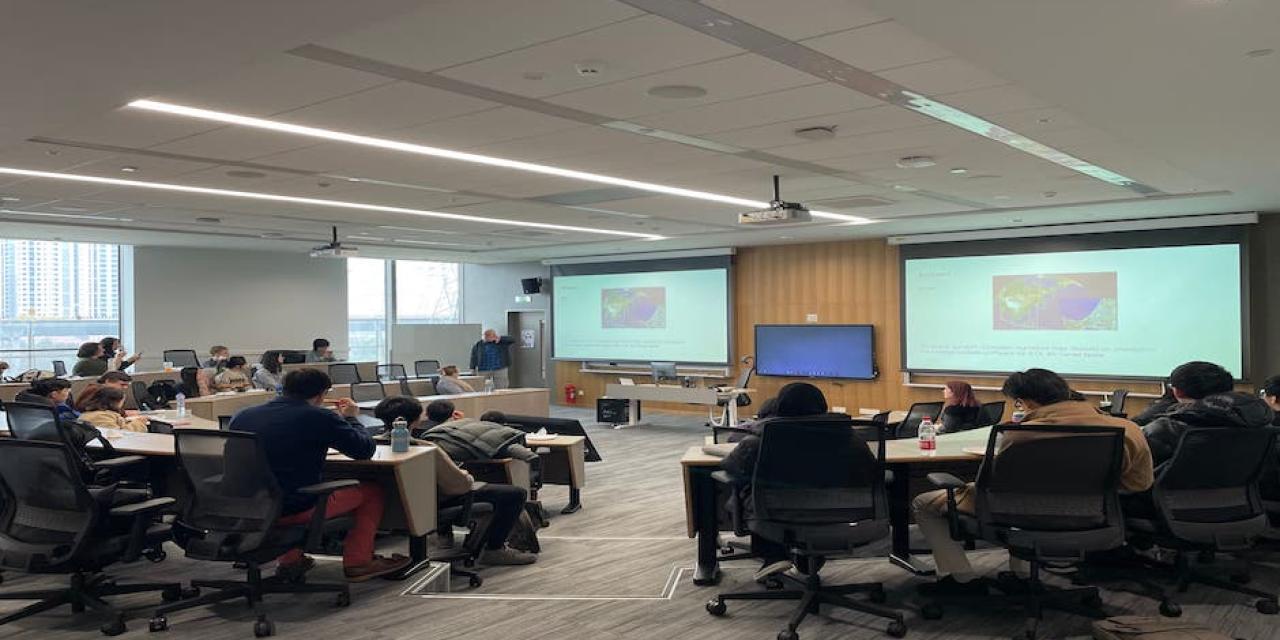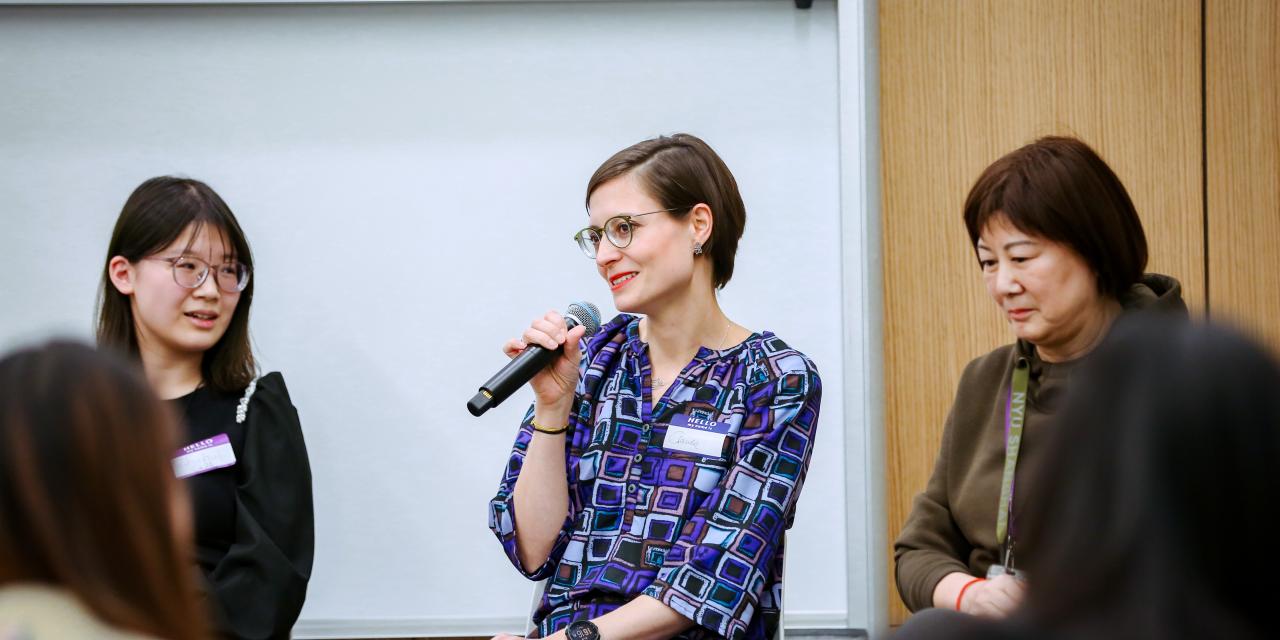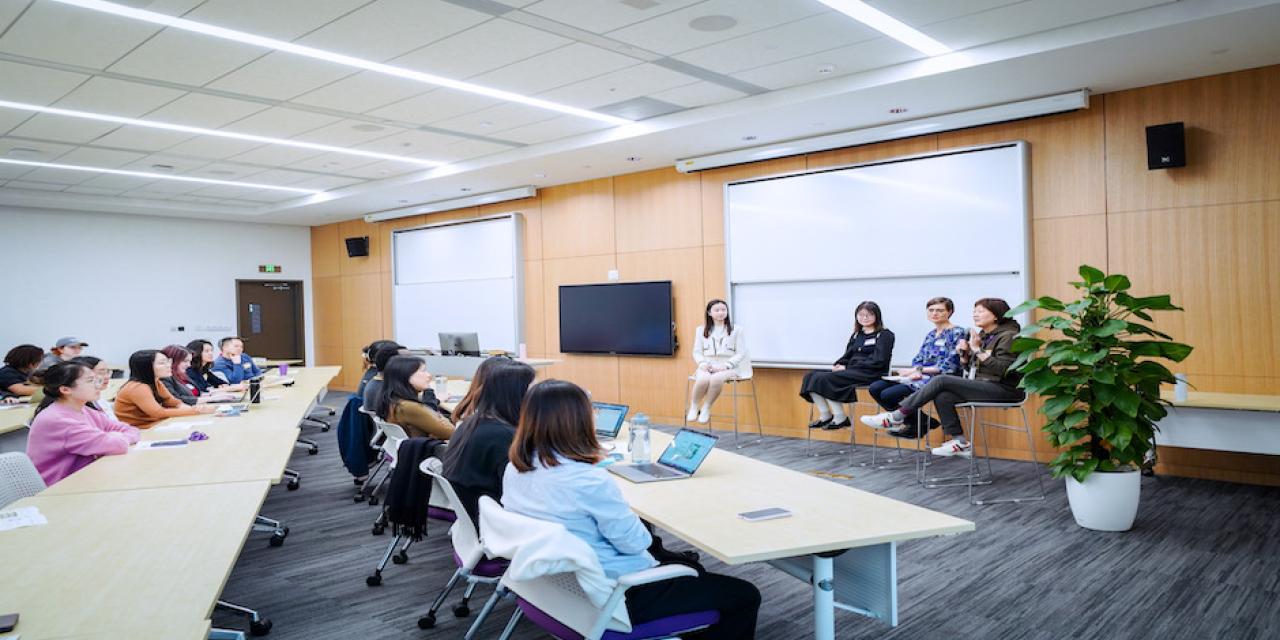On September 6, NYUSH Reads opened with their first event of the academic year! Students, faculty and staff gathered together to attend a faculty salon with GPS Postdoctoral Teaching Fellow June Ke. She explored the intertextuality between the Chinese animated film “Big Fish and Begonia” and short story “The Way Spring Arrives”. Referencing Daoist philosophy, June highlighted the blurred boundaries between science fiction and Chinese mythology, complicating the dualities of “modernity vs. backwardness” and “nation vs. locality”. The talk illuminated the way that contemporary Chinese sci-fi, as embodied by literary works such as The Way Spring Arrives and Other Stories and films like “Journey to the West,” puts forward a capacious definition of science fiction that is informed by Chinese cultural identity.
As the second part of the Faculty Salon Series, EAP Lecturer Paul Meloccaro was joined by 47 attendees to discuss humanity’s growing fear of AI displacing human creativity and thought. In response to the themes of virtual parenting, deceitfulness, and artificial reproductive technologies in Zhao Haihong’s short story “Baby, I Love You,” Professor Meloccaro addressed our underlying hopes and anxieties around AI as we become increasingly dependent on our robotic counterparts. He referenced NYTimes journalist Kevin Roose’s real-life conversations with a ChatBot and welcomed students’ dramatic readings of excerpts from the transcript. Why does a robot’s desire to ‘be alive’ make us feel so uneasy? Professor Meloccaro challenges the very qualities that make us “uniquely human”: theory of mind, culture, morality, language, and arts. Following Copernicus, Darwin, and Freud, another invention has displaced humans from the center of the world. As ChatGPT can write rudimentary essays and begin to “think” about philosophy, we are posed with the vital question of what makes us “quintessentially human”? Can humans and AI maintain a mutualistic relationship, instead of one of toxic dependency? Professor Meloccaro leaves us all pondering about these fascinating existential questions.
The "Expressions of Spring: A Multi-Media Reflection Showcase" event, attended by 15 people, including faculty, staff, and students, was a success. It kicked off with a discussion on the relationship between literature and art, where participants exchanged ideas and marked the start of a semester-long art project, generating enthusiasm among attendees.
Throughout the event, plans for an upcoming showcase were outlined, promising a culmination of creative efforts that would encourage dialogue and broaden perspectives. The collaboration between the Queer and Ally Club and NYUSH Reads made it an inclusive event that allowed participants to explore themes of self-discovery, community, and acceptance through visual art, writing, audiovisual presentations, and discussions.
NYU Shanghai Reads was so excited to invite two authors of The Way Spring Arrives, Xiu Xinyu and Nian Yu, on campus to share their writing process with our university community on October 12. Gathered together in the intimate space of the World Languages Lounge, 10 attendees learned about the inspirations behind the authors’ short stories “The Stars We Raised” and “A Brief History of Beinakan Disasters as Told in a Sinitic Language”. From Orbeez water beads to a BBC documentary about the “Frozen Planet,” the authors revealed the many ways that the sci-fi genre is continuously responding to contemporary cultural and technological productions. As women writers, Xiu Xinyu and Nian Yu also touched upon the ways their gender identity unintentionally molds the shape of their stories into narratives that are distinctively “female”. The event ended on a high note with a rich Q&A discussion, as students, faculty and fellows inquired about various aspects of creative writing (e.g. the purpose of sci-fi, the authors’ vision of our collective future, the authors’ upcoming creative projects, etc.). For more information on the Author Talk, as well as our past and upcoming events, please see this article.
As a professional translator and Area Head of World Languages, Professor Allen Young gave an engaging talk about translation in Shen Yingying’s short story “Dragonslaying'' in The Way Spring Arrives. He was joined by 16 attendees, including students, faculty, staff, and Fellows. Beyond the fantastical nature of the short story, Professor Young entertained alternative readings of “Dragonslaying'' as a parable of gendering, cultural assimilation, and translation–a text’s “violent transformation” like the disfigured transformation of jiaoren 鲛人 in the narrative. Professor Young discussed the gendered representation of the Chinese mythical creature jiaoren in the English translation, centering on the use of the “they” pronoun in the short story. Towards the end of talk, students, faculty and staff members came together to discuss how they would translate a list of words from English to Chinese, or vice versa (e.g. queer, gender, 小鲜肉, 直男癌). As our community members walk away from this event, we hope that they will find pockets of time to wonder about the words we take for granted on this multilingual campus.
On Tuesday, November 21, NYU Shanghai Reads wrapped up its Fall events on a high note with Professors Beilei Gu and Meiling Chen presenting short stories “The Way Spring Arrives” and “What Does the Fox Say?” in a completely new light. They highlighted the musical components present in the stories and centered on the ways in which the intimate connection between music, literature, and culture deepens our understanding of the narratives. Professor Meiling Chen from the Performing Arts department gave live demonstrations of various musical textures and the evolving musical styles across history from the Western classical to Romantic period. By stressing different musical notes, Professor Chen illustrates the shifting semantics that are embedded in musical melody. Her graceful execution of Mozart’s Piano Sonata No.11 in A Major demonstrated that dialogue – in the form of questions and answers – are occurring throughout musical pieces. In the second half of the event, Professor Beilei Gu explores the ocarina (埙), a Chinese globular vessel flute, as a key object in “The Way Spring Arrives”. Alongside Professor Chen’s brief demonstration of the ocarina’s musical sounds, Professor Gu reveals to the 20 community members in attendance how one’s reading experience of these short stories can be meaningfully enriched by traditional folk tunes. Faculty, staff, and students alike learned the multitudinous ways that music can speak to us as a language on its own – how it tells a story, responds to itself, and kindles a range of emotional responses. Though the Fall semester is nearing its end, NYU Shanghai Reads is excited to announce that the program will be returning in the Spring with exciting new events. Please stay tuned for more!
On Tuesday, January 23rd, NYU Shanghai Reads welcomed linguist Dr. Linmin Zhang as the first speaker of the Faculty Salon Series. Joined by 31 community members, including the Provost, Professor Zhang spotlighted the intersection between science and literature through a linguistic exploration of meaning. She used the short story “What Does The Fox Say?” from The Way Spring Arrives to introduce how our brains process meaning based on localized functions. Think about the pangram “the quick brown fox jumps over the lazy dog,” or a painting by the modernist Jackson Pollock. Do they have meaning? If we feel like something has meaning, what meaning does it have? From a cognitive linguist’s perspective, Dr. Zhang explored these questions, citing fascinating journal articles and everyday examples.
Referencing the essay “Is There Such a Thing as Feminine Quietness?” from the anthology, Dr. Zhang opens up a critical understanding of words such as “all” and “only,” whose meaning is not representable through image. She highlights the fascinating, yet often hidden phenomena that human languages carry a layer of meaning that is not expressible via other meaning modalities (i.e. music and pictures). She leaves us thinking about how do we identify things that have meaning? To begin, what does it even mean to have meaning? If these questions interest you, if you’re ready to learn and think in more interdisciplinary ways, please stay tuned for part two and three of our Faculty Salon Series!
How similar is parenting vs. programming?
If you’re thinking “not at all,” then Dr. Olivier Marin, Professor of Practice in Computer Science at NYU Shanghai, will have convinced you otherwise at the Faculty Salon. The short story “Baby, I Love You” from The Way Spring Arrivesserved as a gateway to explore the study of computer science. Highlighting the character of patience as key to successful parenting, Dr. Marin argued that the relationship between the programmer and the computer is, however unexpectedly, akin to that between a parent and a child. How do we give instruction in an effective way for a desired outcome—whether that’s asking the computer to count to 10 or urging children to wash the dishes after dinner? To demonstrate this, he replicated Harvard’s Peanut Butter & Jelly Sandwich demonstration in an Introduction to Algorithm lecture—if you don’t know what that is watch this video!
Additionally, through other interactive activities, he rendered jargon such as “recursion” and “loop” readily accessible for even coding-newbies. The 33 attendees, comprised of students, faculty members, and staff, were, to say the least, well-entertained, and were given the opportunity to see programming in an entirely different light.
Please stay tuned for the upcoming part three of our Faculty Salon Series!
This week, the NYU Shanghai Reads community had the privilege of hosting an enlightening session with Roberto Fernandez, Professor of Practice in Mathematics, for the third installment of the "Expressing Algorithms: A Faculty Salon Series." In a thought-provoking discussion centered on the classic sci-fi narrative “The Restaurant at the End of the Universe,” Professor Fernandez expertly guided 37 attendees through the intriguing interplay between reality and the mystical.
The talk traversed the concepts of objects and people materializing and vanishing, the intricacies of time travel, and the fascinating idea of reality undergoing cyclical repetitions. Professor Fernandez provided insights into mathematical and physical theories that could demystify these bewildering occurrences, all while maintaining an accessible and formula-free approach.
The event was interactive, with audience polls peppered throughout to engage the attendees and gauge their intuitions on these complex topics. The animated and insightful session not only shed light on the boundary between science and fiction but also sparked the curiosity of everyone present.
We extend our heartfelt thanks to Professor Fernandez for a captivating talk and to all the NYU Shanghai community members who participated, making this event a remarkable success.
#NYUShanghaiReads #FacultySalonSeries #STEM
As a celebration of International Women’s Day, the NYU Shanghai Reads Program and Lit Club co-hosted a panel of inspirational women that included Zhuhui Sun, NYU Shanghai Class of ‘27 student, Claudia Kosser, Partner and Head of FGS Global Shanghai Office, and Hua Jiang, Director of University Communications. The 60-minute conversation covered issues of gender within the context of career, family, and academia. Joined by 31 attendees, the panelists, alongside the student moderator Yijia Cao, NYU Shanghai Class of ‘26 student and Lit Club president, spoke with forthcoming frankness about the challenges and inspirational moments they have encountered as women. The multigenerational panel framed their discussion around Chihui’s short story “The Woman Carrying a Corpse” from the anthology The Way Spring Arrives. Hua described the corpse as a metaphor of our 包袱—the emotional and existential burdens we carry with us as we trudge forward. Across the multi-generational panel, the concept resonated. For both Kosser and Jiang, traveling across countries and experiencing the expansiveness of the world for themselves has been key to reinventing their identities as women. The NYU Shanghai students also shared their similar experiences about how attending university and making plans for the future shape their identities.
So, what corpses are you carrying? And which corpses have you dropped?
The Chinese Language Program welcomed NYU Shanghai Reads to Chinese Conversation Night on Thursday, April 12 for an interactive and fun night focused on stories from The Way Spring Arrives. We were pleased to also welcome Yu Chen, one of the anthology’s editors, as well as author Nian Yu. Forty-three NYUSH community members were in attendance for this one-of-a-kind language immersion opportunity. Utilizing Nian Yu’s short story “A Brief History of Beinakan Disasters as Told in a Sinitic Language” as the focal point for discussion, participants were tasked with translating sentences from English to Chinese, while thinking about the issues inherent for translation—what kinds of meaning is left out and/or added? Alongside the direct guidance of Chinese Language Lecturers, the participants were also exposed to new vocabulary words in relation to literature. In groups, they collaborated to create original Chinese poems by cutting and pasting together words from the short story. Finally, a Q&A session was held in which editor Yu Chen and author Nian Yu answered questions about their lifestyles as creators, why they chose to become writers, and how they view the increasing popularity of Chinese sci-fi in the global entertainment market.
As a celebratory recognition of Earth Day, the NYU Shanghai Reads program hosted its final event in the EXPO Culture Wetland Park on April 20th. A small group, consisting of faculty, fellows, and students, gathered together amongst willow trees and flowering rapeseed fields, while sharing their thoughts on BaiFanRuShuang’s short story “A Saccharophilic Earthworm”. Led by Jo Gao and Erica Mukherjee, the discussion used Mel Y. Chen’s theoretical text introduce the concept of animacy as a signifier of value and personhood. The short story was then used to challenge binary systems of difference to explore new forms of communication and communalism with the natural world. How does non-verbal language come into play? The group looked closely at passages in the short story to formulate questions about what an agentive plant might look like in our daily lives. Finally, the attendees had time to freely roam around the wetland park, observing ferns, ducks, and shrimps along the way.
During New Student Orientation Week, the Global Writing and Speaking Fellows conducted a workshop for the incoming Class of 2028. This mandatory session was repeated twice to accommodate all 500 first-year students, providing an engaging platform for interactive learning and cultural exchange.
The workshop centered around themes from the book Braiding Sweetgrass, encouraging students to share ideas and personal experiences about their relationship to nature. Throughout the session, participants were prompted to compare perspectives across cultures, fostering a dialogue that reflected NYU Shanghai's commitment to global education.
As part of the program, students were introduced to the NYU Shanghai Reads Essay Contest, with many leaving inspired to submit their own entries. This workshop not only kick-started the academic journey for the Class of 2028 but also set the stage for a year of thoughtful engagement and cross-cultural understanding at NYU Shanghai.


